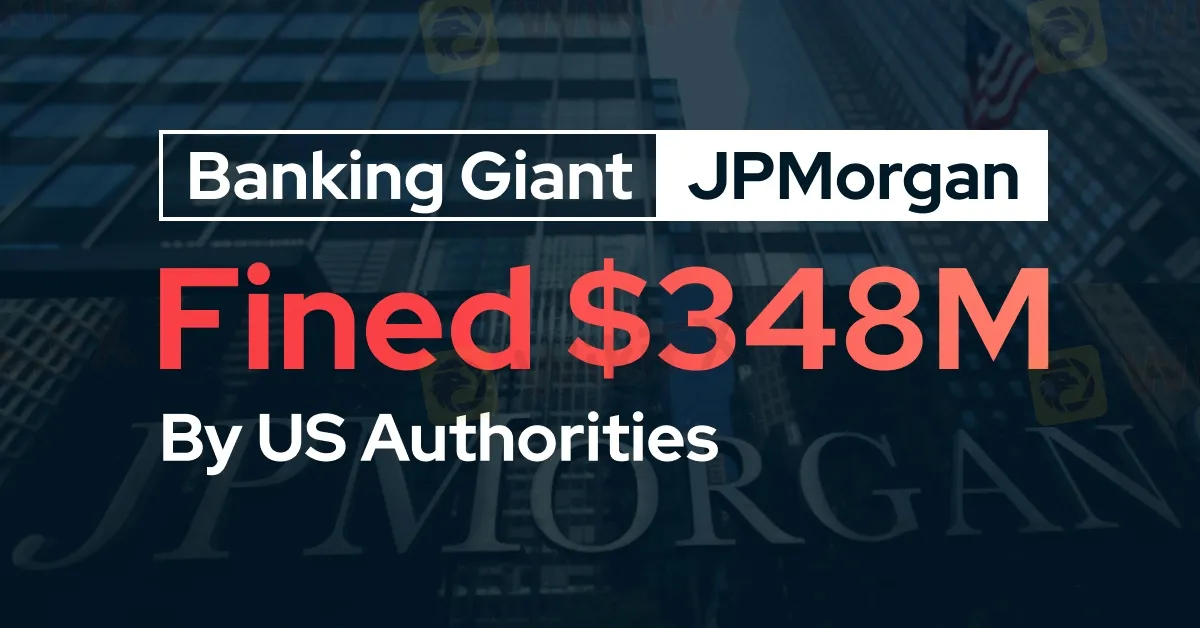简体中文
繁體中文
English
Pусский
日本語
ภาษาไทย
Tiếng Việt
Bahasa Indonesia
Español
हिन्दी
Filippiiniläinen
Français
Deutsch
Português
Türkçe
한국어
العربية
Banking Giant JPMorgan Fined $348M By US Authorities
Abstract:JPMorgan Chase (JPM) finds itself in the spotlight as it agrees to pay a substantial $348 million in fines to US regulatory bodies for alleged negligence in monitoring both client and staff trading activities. This financial penalty ranks among the largest imposed on any financial institution in 2024.

JPMorgan Chase (JPM) has recently agreed to pay a hefty sum of $348 million in fines to US regulatory bodies for purportedly neglecting to oversee the trading activities of both its clients and staff members. This penalty stands as one of the largest levied against any financial institution in 2024.
The fines, imposed by both the US Federal Reserve and the Office of the Comptroller of the Currency (OCC), are linked to problems within the trading program of the American banking giant from 2014 to 2023, as stated by the Fed. As per the Fed's statement, JPMorgan faced a fine of approximately $98.2 million for its operation of “an inadequate program to monitor both firm and client trading activities for potential market misconduct.” Similarly, in a separate announcement, the OCC declared that it had imposed a civil penalty of $250 million on the bank, citing its findings that JPMorgan had been engaging in practices deemed unsafe or unsound and had not put in place sufficient governance over the trading venues it operates.

Both regulatory bodies have mandated a series of corrective measures. However, JPMorgan has neither admitted nor refuted these allegations. Consequently, the bank witnessed a decrease in its stock value by over 1% on Thursday afternoon.
In a filing submitted to the SEC last month, JPMorgan disclosed this issue, affirming that it had not found any evidence of employee misconduct or harm to clients or the market. Furthermore, it expressed confidence that client services would remain unaffected as remedial measures have been implemented.
In addition, in its disclosure last month, JPMorgan revealed ongoing advanced discussions with a third US regulatory authority, though the outcome of these discussions remains uncertain.
In a similar vein, in mid-January, Morgan Stanley (MS) reached a settlement whereby it agreed to pay $250 million in fines to the Justice Department and SEC, effectively concluding a multiyear investigation into its handling of significant “block” trades for clients spanning from 2018 to 2021. Morgan Stanley admitted to making false statements regarding some of these trades.

Disclaimer:
The views in this article only represent the author's personal views, and do not constitute investment advice on this platform. This platform does not guarantee the accuracy, completeness and timeliness of the information in the article, and will not be liable for any loss caused by the use of or reliance on the information in the article.
Read more

IMF Warns of Global Risks as US Slaps 50% Tariffs on Import
The IMF warns of rising global uncertainty after the US imposes a 50% tariff on copper and Brazil imports. Factories worldwide brace for economic fallout.

FCA’s Tech Crackdown Suspends 1,600+ Financial Sites
The FCA’s 2024 report details a tech-driven crackdown on financial crime, suspending 1,600+ sites and increasing firm authorisation cancellations in the UK.

Breaking News: OmegaPro Caught in a $650 Million Forex and Crypto Investment Scam
An indictment was leveled against two men in the District of Puerto Rico for their alleged involvement in the operation and promotion of OmegaPro, an international investment scheme that has led to financial losses worth over $650 million for investors. Check more about this story

Fed Rate Cuts May Not Happen in July, Markets Await Policy Meeting Minutes Release
Federal Reserve officials had a meeting on June 17-18 during which some of them expressed a fall in interest rates in July. However, a lot of policymakers are still worried about the inflationary pressures that might emerge from US President Donald Trump’s import tariff decisions aimed at changing global trade. So, it seems the rate cut may not happen in July. Read this to know more.
WikiFX Broker
Latest News
US Government Interest Grows in Victory Metals’ Rare Earths Supply
How Are Trade Policies Affecting the Aluminum Market?
RM71,000 Lost in a Share Scheme That Never Existed
Scammed by a Click: He Lost RM300,000 in a Month
Manual vs. Automated Forex Trading: Which One Should You Choose?
Revealing Factors That Help Determine the Gold Price in India
Why Regulatory Compliance Is the Secret Ingredient to Trustworthy Forex Brokers
Pentagon to become largest shareholder in rare earth miner MP Materials; shares surge 40%
Delta shares jump 12% after airline reinstates 2025 profit outlook as CEO says bookings stabilized
Delta shares jump 13% after airline reinstates 2025 profit outlook as CEO says bookings stabilized
Currency Calculator


